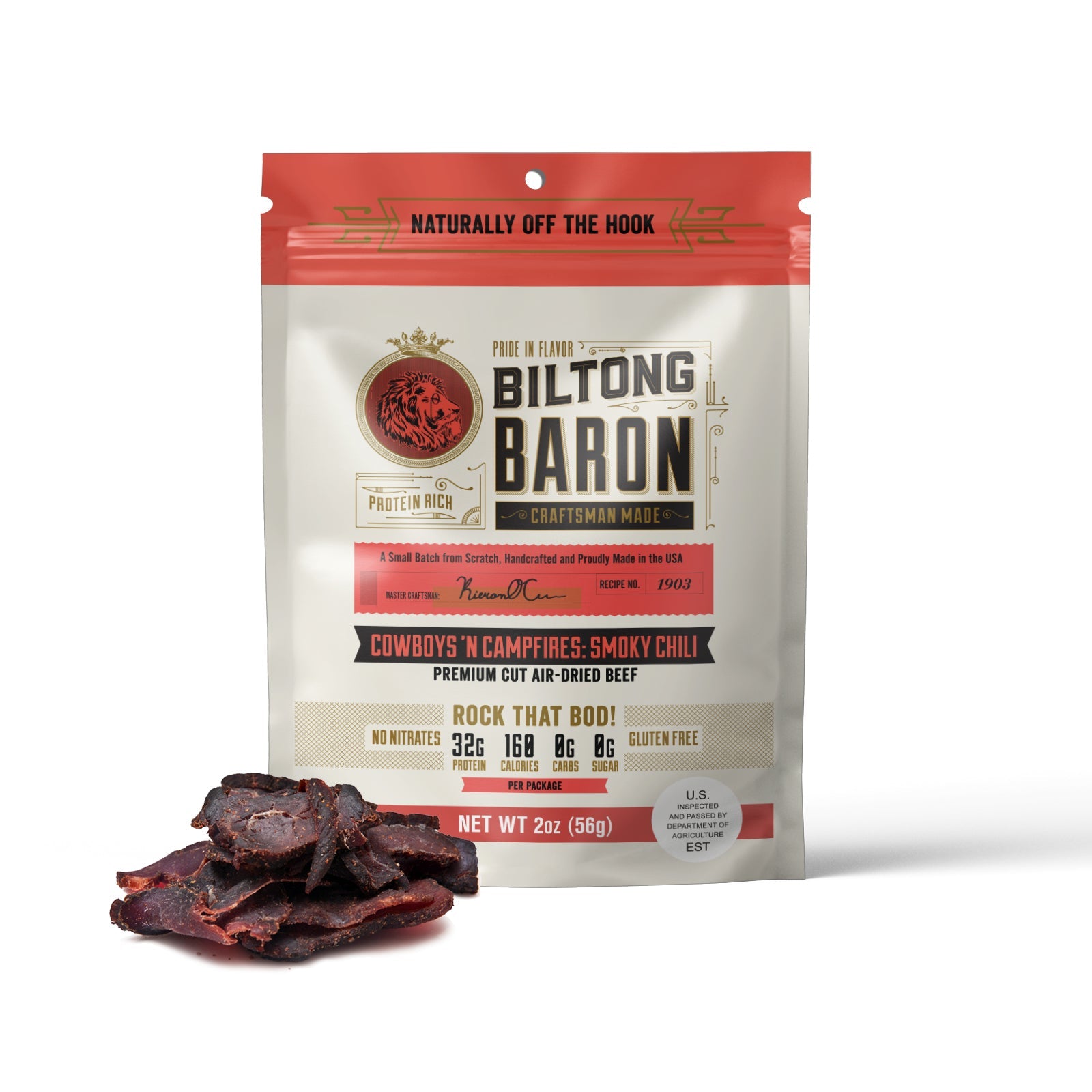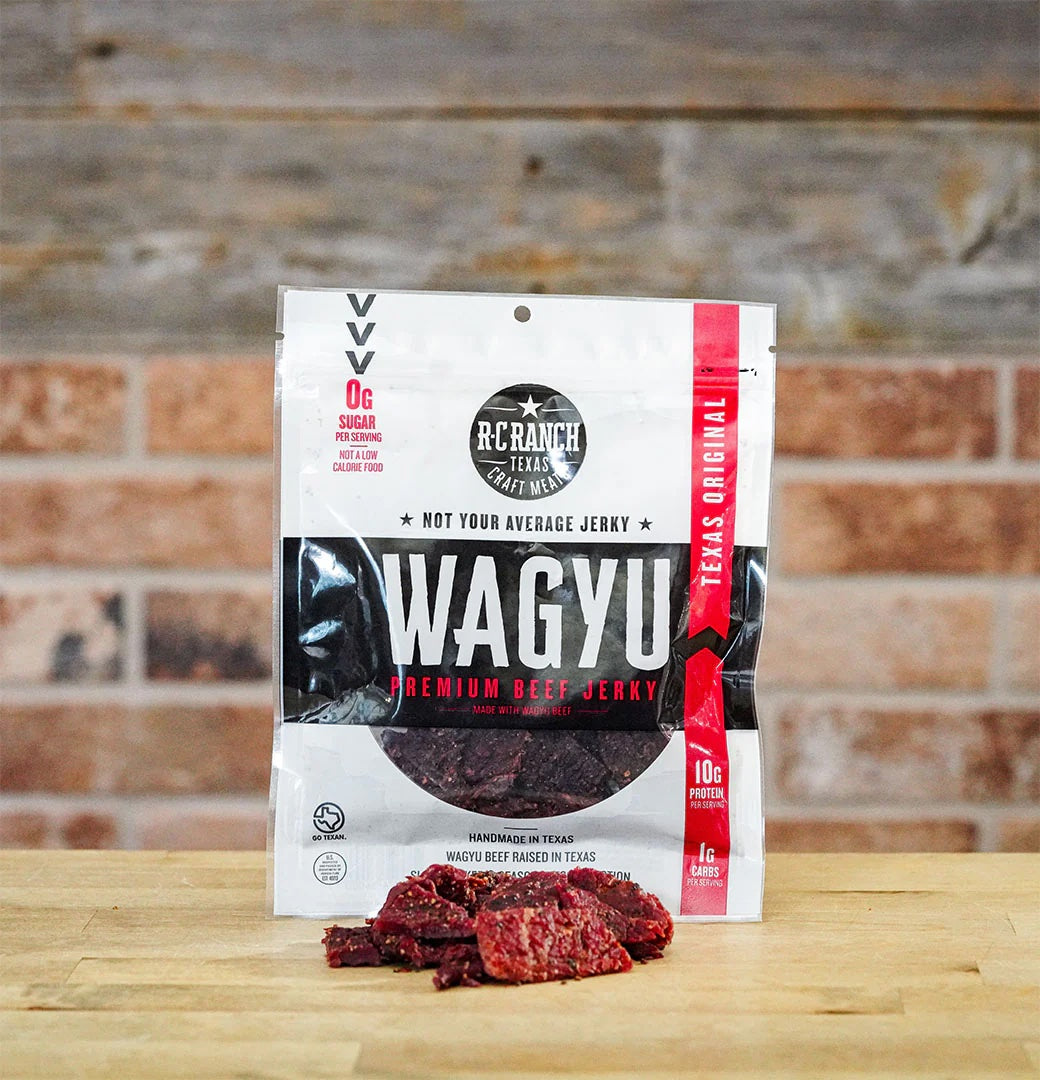-
Recently Viewed
You have no recently viewed items.
-
Featured Brands
- All Products
- About Us
- Contact Us
- Our Blog

Beef Jerky Nutrition Guide
If you dig jerky (and we know you do), it’s key to know its nutrition facts. And because beef is the standard for most jerkies, let’s look at beef jerky nutrition info.
That’ll give you a baseline, although homemade beef jerky nutritional info will differ according to your marinade and jerky type. Hey, we know you want to eat well, and in the Jerky Universe, we’re all about that!
Beef Jerky Nutrition Facts
Let’s get straight to the meat of the matter (pun intended).
Here are the average beef jerky nutrition facts, according to Healthline and the U.S. Department of Agriculture (USDA). We’ve followed the 2,000-calorie daily diet numbers and daily values (DVs), as you see on nutrition labels.
|
Serving Size: 1 Ounce (28.4 grams) Beef Jerky |
|
|---|---|
|
Calories |
116 |
|
Fat |
7.3 grams (3.1 grams saturated fat) |
|
Protein |
9.4 grams |
|
Carbohydrates |
3.1 grams |
|
Sugar (as part of carbs) |
2.6 grams |
|
Fiber |
0.5 grams |
|
Sodium |
590 milligrams |
Note: If you eat beef jerky by the cup (or handful), please note 1 cup (dry) holds about 6.8 to 8 ounces (dry).
Beef Jerky Calories
Calorie count is the basis for most healthy diets. According to a whole host of factors — like your age, weight and physical activity level — your personal calorie needs vary.
Generally, 1 ounce of beef jerky has 116 calories. That’s comparable to 1 ounce of air-popped popcorn!
Beef Jerky Protein Content
You get about 9.4 grams of protein per 1 ounce of beef jerky. The recommended protein DV is 50 grams.
A snack-sized bag of jerky usually holds 3 to 4 ounces, and a bigger bag holds about 8 ounces. So when you eat a snack-sized bag of beef jerky, you also enjoy most of your protein DV!
Beef Jerky Carbs
You’d think beef jerky would be carb-free because, well, it’s meat instead of bread. But marinades and seasonings definitely add carbs, including sugar.
Generally, 1 ounce of beef jerky has 3.1 grams of carbs.
Beef Jerky Fat Content
You won’t get too much fat with average beef jerkies. In standard beef jerky, fat content is about 7.3 grams. Chicken and mushroom jerkies tend to have less fat.
Beef Jerky Sodium Content
Per 1 ounce of beef jerky, you get about 590 milligrams of sodium. The U.S. Food and Drug Administration (FDA) recommends adults eat no more than 2,300 milligrams of sodium per day.
Basically, beef jerky contains a good bit of sodium (it’s salted and dried meat, after all). If you eat a 3-ounce snack-sized bag of beef jerky, you’ll get very close to your sodium DV.
In beef jerky, sodium varies according to marinade and seasonings. (That’s a recurring theme, but remember that you can buy or make low-sodium jerkies.)
Beef Jerky Fiber Content
You get about 0.5 grams of fiber per 1 ounce of beef jerky. Frankly, that’s not much — you might pair it with an apple when you’re hiking or on the move.
Mayo Clinic suggests people eat 25 to 38 grams of fiber daily. In other words, you’d go way over your other nutrient DVs if you tried to get fiber from beef jerky alone.
Beef Jerky Iron Content
When eating 1 ounce of beef jerky, iron content clocks in at around 8% of your DV (about 1.54 milligrams).
Beef Jerky Sugar Content
In general, 1 ounce of beef jerky has about 2.6 grams of sugar. Again, the marinade and seasonings that go into making your beef jerky play huge parts.
Beef Jerky Folate Content
First, what’s folate? In essence, it’s folic acid, and your body needs it for all kinds of important functions. In 1 ounce of beef jerky, you get about 9% of your folate DV, or 37.99 micrograms.
Beef Jerky Vitamins and Minerals
We’ve covered iron and folate, but what about other beef jerky nutrition information, like vitamins and minerals? Let’s see here (per Healthline, the USDA, National Institutes of Health [NIH] and Mayo Clinic).
|
Serving Size: 1 Ounce (28.4 grams) Beef Jerky |
|
|---|---|
|
Vitamin/Mineral |
Percent and DV (2,000-calorie daily diet) |
|
Zinc |
21% (8-11 milligrams DV) |
|
Vitamin B12 |
12% (2.4 micrograms DV) |
|
Vitamin B6 |
5% (1.3-1.9 milligrams DV) |
|
Phosphorus |
9% (700 milligrams DV) |
|
Copper |
7% (1,100-1,400 micrograms DV) |
|
Choline |
6% (425-550 milligrams DV) |
|
Potassium |
4% (2,600 milligrams DV) |
|
Magnesium |
3% (320-360 milligrams DV) |
|
Selenium |
5% (55 micrograms DV) |
|
Thiamine |
4% (1.0-1.1 milligrams DV) |
|
Riboflavin |
3% (1.0-1.1 milligrams DV) |
|
Niacin |
3% (21.3-31.4 milligrams DV) |
Vitamins, minerals and beef jerky nutritional benefits go beyond this table, but these pack the greatest punch for your body!
[Related: Is Beef Jerky Good for Diabetics?]
Takeaways
Luckily, beef jerky gives you a good number of health benefits when you eat it responsibly. We know it’s tempting to scarf down an 8-ounce bag, but it’s smartest to stick with snack-sized portions.
Of course, jerky types (beef, chicken, pork, mushroom, etc.) and recipes have different nutritional info. If you’re following a particular diet, check the nutrition label for important elements like fat, sodium and sugar. And it’s always wise to speak with your doctor, dietician or nutritionist.
Overall, beef jerky nutrition data shows it’s a swell source of protein, iron, zinc and folate. Plus, if you tend to get hungry easily, beef jerky is satisfying and can curb cravings. Because it’s a dehydrated food, it swells in the stomach and makes you feel full.
[Related: Is Beef Jerky Healthy?]
Beef Jerky Nutrition FAQs
We’ll try to address all the important beef jerky nutrition facts in our beef jerky nutrition FAQs. (See what we did there? It rhymes.)
Please remember that your unique nutritional needs may differ, so this is a broad overview. We’re working from the perspective of an adult eating a 2,000-calorie daily diet.
Does Beef Jerky Have Carbs?
Yes, beef jerky has carbs — about 3.1 grams per ounce. Your recommended carb DV is 225 to 325 grams.
The carb count per ounce also depends on your chosen jerky’s marinade and beef cut. If you’re concerned about cutting carbs for health, check out low-carb jerkies, like those from JustMeat.
Does Beef Jerky Have Fat? Does Beef Jerky Make You Fat?
Beef jerky has fat, but it doesn’t have a whopping amount of it. A serving of about 7 grams of fat per ounce isn’t outrageous.
And beef jerky shouldn’t make you fat unless you eat a ton of it alongside other high-fat foods. Ideal fat intake varies per person, but fats should make up around 30% of your daily calorie intake. Actually, finding your target fat consumption demands doing a bit of math.
The more important issue is avoiding eating too much saturated fat, which can raise your cholesterol levels. If you’re making homemade beef jerky, nutritional info differs according to what you use in your recipe. You can even make keto-friendly jerky!
In fact, fat often gets a bad rap. Our bodies and brains need some fats to function. If you’re interested, Pennsylvania State University has a thorough breakdown of healthy fat consumption.
How Much Protein Does Beef Jerky Have?
Beef jerky has roughly 9.4 grams of protein per ounce, and that’s a hefty amount. Your recommended protein DV is 50 grams.
Still, moderation is the name of the game. Remember that this number varies according to your age, physical activity level and other personal factors. If you’re really invested, you can do some more math (thrilling, we know).
When you need a quick pre- or post-workout snack, a couple ounces of beef jerky can give you a solid protein boost.
How Many Calories Are in Beef Jerky?
Per ounce, beef jerky has about 116 calories. It’s not a calorie-dense food, so beef jerky is a surprisingly light snack choice — in moderation.
Does Beef Jerky Have a Lot of Sodium?
Compared to other snacks, beef jerky has a good deal of sodium at 590 milligrams. The FDA and the American Heart Association (AHA) suggest eating no more than 2,300 milligrams of sodium daily.
So once again, it’s smart to stick to one snack-sized bag of beef jerky to not exceed your sodium DV. Too much sodium can raise your blood pressure and damage your cardiovascular system.
But don’t worry, beef jerky aficionados. As long as you take it easy on the serving size, you should be fine. Plus, many brands (like PREVAIL) offer low-sodium jerkies, and biltong tends to have less salt.
Does Beef Jerky Have Fiber?
Well, beef jerky has a teensy amount of fiber at about 0.5 grams per ounce. Because you ideally should eat at least 25 grams of fiber daily, that’s not much. You can always add a side — like popcorn, fruit or nuts — to balance it out.
How Much Sugar Is in Beef Jerky?
The average beef jerky variety has 2.6 grams of sugar per ounce. The AHA-recommended sugar DV is 25 to 36 grams.
If you want to nix sugar, check out low-sugar jerkies like the ones in JustMeat’s selection. (We know we name-dropped them already, but low-to-no sugar is their thing!)
And if you’re making homemade beef jerky, nutrition is largely up to you. Although sugar helps jerky stay moist and adds flavor, you can opt for far less sweet marinades. A few options include monkfruit, no-sugar-added pineapple juice and keto brown sugar.
Does Beef Jerky Have Iron in It?
Yes, beef jerky certainly has iron! One ounce usually carries 1.5 milligrams of iron. That’s about 8% of your iron DV, which the NIH lists at 8 to 18 milligrams.
Why the 10-milligram discrepancy? Biological women need more iron than biological men to avoid anemia.
[Related: Where To Buy Beef Jerky]
Traverse the Jerky Universe
We hope we’ve addressed your most burning beef jerky nutrition questions. In the Jerky Universe, we want everyone to be able to nosh on jerky worry-free. You can find even more nifty beef jerky health benefits on our blog.
Subscribe to our newsletter and follow us on social media below! You’ll find fascinating histories, top-notch products, tasty recipes and info on all things jerky.
Featured image via Pexels
Table of Contents
- Choosing a selection results in a full page refresh.









